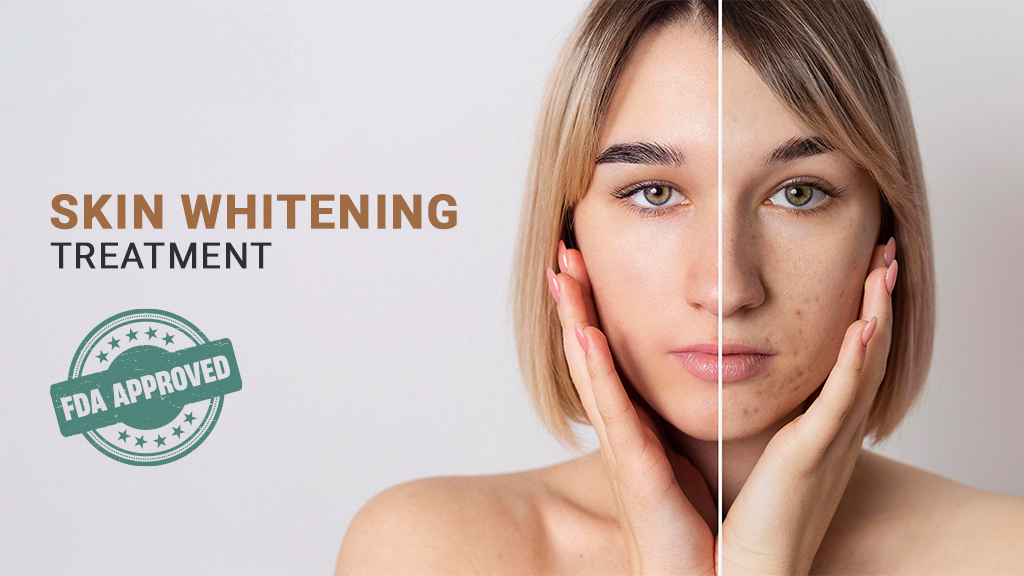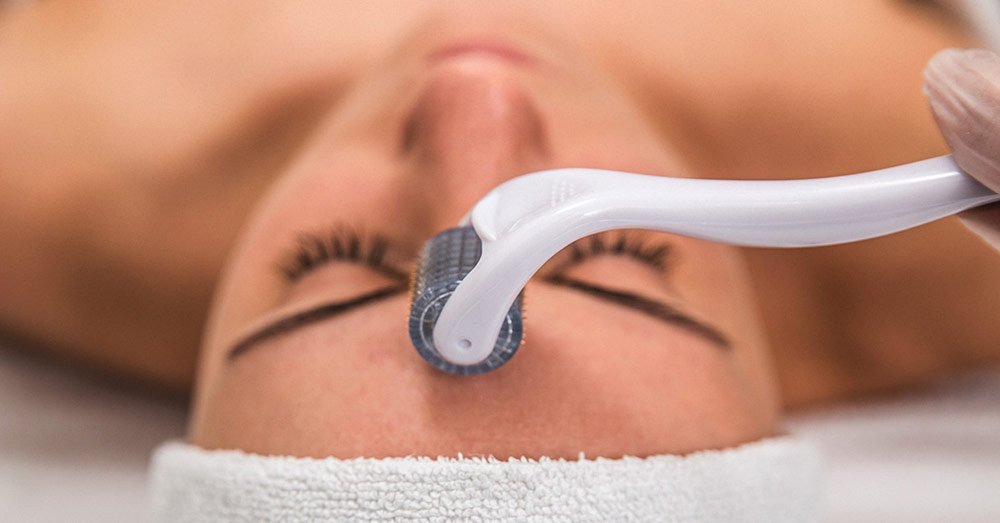What is Skin whitening treatment?
Skin whitening treatment refers to a range of cosmetic procedures and products designed to lighten the skin tone by reducing pigmentation, dark spots, and uneven skin tone. The goal is to achieve a fairer or more uniform complexion. While the term “whitening” is commonly used, it’s often more about brightening or evening out the skin tone rather than drastically changing the natural skin color.
Different Types of Skin Whitening Treatments
Chemical Peels
Chemical peels involve applying a chemical solution to the skin to exfoliate the outer layers, revealing newer, more even-toned skin beneath. They are especially useful for treating dark spots, acne scars, and sun damage.
- Glycolic Acid Peels: These alpha-hydroxy acid (AHA) peels exfoliate the skin and promote cell turnover, helping to lighten pigmentation.
- Salicylic Acid Peels: Salicylic acid, a beta-hydroxy acid (BHA), works well for treating acne scars and improving skin tone.
- Trichloroacetic Acid (TCA) Peels: A deeper chemical peel that targets more severe pigmentation and skin imperfections, leading to clearer, more even skin.
Laser Treatments
Laser treatments target deeper layers of the skin and help break down melanin (the pigment responsible for dark spots and skin discoloration). These are more advanced treatments and often yield faster, more noticeable results.
- Fractional CO2 Laser: This laser helps treat pigmentation, acne scars, and other skin imperfections by stimulating collagen production and promoting skin regeneration.
- Q-Switched Nd:YAG Laser: This laser is commonly used to treat dark spots, melasma, sun damage, and age spots. It targets pigmentation without harming the surrounding skin.
- Alexandrite Laser: Known for its ability to treat pigmentation issues, this laser is often used for skin lightening in patients with fair to medium skin tones.
Intense Pulsed Light (IPL) Therapy
IPL uses light energy to target and break down pigmented cells in the skin. It’s effective for treating sun spots, age spots, and hyperpigmentation by reducing excess melanin and promoting skin rejuvenation.
- Benefits: IPL is non-invasive and can treat a variety of pigmentation issues, improving overall skin tone and texture.
Microneedling
Microneedling involves using tiny needles to create micro-injuries in the skin, stimulating collagen production and encouraging skin regeneration. It can help fade dark spots, acne scars, and hyperpigmentation over time.
- Combined with serums: Microneedling can be combined with skin-lightening serums such as Vitamin C, hyaluronic acid, or retinoids to enhance the results.
Cryotherapy
Cryotherapy, or “skin freezing,” involves applying extreme cold to targeted areas of the skin to treat pigmentation and sun damage. It can be used to freeze off dark spots and unwanted pigmentation, resulting in clearer skin.
Benefits of Skin Whitening Treatments
Undergoing skin whitening treatments can offer several benefits, especially for individuals seeking a brighter complexion or trying to address hyperpigmentation issues.
Boosting Skin Tone and Radiance
One of the primary reasons people seek skin whitening treatments is to achieve a more radiant and even skin tone. Whitening treatments can help restore the skin’s natural glow and make it appear healthier and more youthful.
Treating Hyperpigmentation and Dark Spots
Skin whitening treatments are particularly effective in treating hyperpigmentation, which can result from sun exposure, aging, or acne. By reducing the appearance of dark spots, these treatments can help restore an even skin tone.
Improving Skin Texture and Smoothness
In addition to lightening the skin, some whitening treatments, such as chemical peels and lasers, also improve skin texture. By removing dead skin cells and promoting new cell turnover, these treatments can make the skin feel smoother and look more refined.
How to Choose the Right Skin Whitening Treatment
Choosing the right skin whitening treatment can be overwhelming due to the wide variety of options available. The ideal treatment depends on several factors, including your skin type, concerns, budget, and lifestyle. Here’s a comprehensive guide to help you make an informed decision when selecting a skin whitening treatment.
1. Identify Your Skin Type
Understanding your skin type is crucial when selecting any skincare treatment, including skin whitening products. Different skin types respond to ingredients differently, and choosing a treatment suitable for your skin type ensures better results and reduces the risk of irritation or other issues. Here’s how to identify your skin type:
- Oily Skin: If your skin looks shiny, especially in the T-zone (forehead, nose, and chin), and tends to break out more often, it’s likely oily.
- Dry Skin: If your skin feels tight, flaky, or rough, you may have dry skin.
- Combination Skin: A mix of both oily and dry areas, often with an oily T-zone but dry cheeks.
- Sensitive Skin: Skin that is prone to redness, irritation, or rashes when exposed to certain products or environmental factors.
Once you determine your skin type, look for whitening treatments formulated specifically for your needs. For instance, oily skin may benefit from gel-based products, while dry skin might need more hydrating formulas.
2. Choose Professional Treatments
These include chemical peels, laser treatments, and professional-grade topical creams. They often offer quicker and more noticeable results, but they are also more expensive and might require more downtime. Professional treatments are a good option if you have severe pigmentation issues or need a more intensive solution.
- Chemical Peels: Professional-grade peels can remove layers of damaged skin, helping to reduce hyperpigmentation and even out skin tone.
- Laser Treatments: Laser skin whitening is more advanced and targets deeper layers of the skin. It offers quick results but can be costly and may require multiple sessions.
3. Consult a Dermatologist
If you’re unsure about which treatment is best for you, it’s always wise to consult a dermatologist. A dermatologist can assess your skin type, concerns, and goals, and recommend the most suitable treatment for your needs. Professional advice ensures you choose a treatment that minimizes risks and maximizes effectiveness.
Additionally, dermatologists can help you determine if you have any underlying skin conditions, such as eczema or acne, that may affect how your skin reacts to whitening treatments. They can also offer guidance on how to integrate skin whitening treatments into your overall skincare routine safely.
4. Consider the Ingredients
The ingredients in skin whitening treatments play a crucial role in determining their effectiveness and safety. Some ingredients are more effective than others, while some may cause irritation, especially for sensitive skin. Here are some commonly used ingredients in skin whitening products:
- Vitamin C: Known for its brightening and antioxidant properties, vitamin C helps reduce pigmentation and improve overall skin tone.
- Hydroquinone: A powerful skin lightening agent that reduces melanin production, hydroquinone is commonly found in many whitening creams but should be used with caution, as it can cause irritation in sensitive skin.
- Niacinamide: This form of vitamin B3 is effective at reducing dark spots, evening skin tone, and improving skin elasticity.
- Kojic Acid: Derived from fungi, kojic acid is another popular skin lightening agent that works by inhibiting melanin production.
Ensure that the product you choose has ingredients that are suitable for your skin type. For instance, if you have sensitive skin, opt for products that contain soothing and gentle ingredients like niacinamide or licorice extract.
5. Evaluate Product Reviews and Reputation
Before committing to a skin whitening treatment, take the time to research the product’s reputation. Check reviews from users with similar skin types and concerns to get a better understanding of the product’s effectiveness and potential side effects. Look for reviews on reputable websites, beauty blogs, or social media platforms.
Additionally, choose brands and treatments that are known for their transparency and ethical standards. Look for certifications and clinical trials to ensure that the product is safe and effective.
7. Consider the Potential Side Effects
Although most skin whitening treatments are safe when used correctly, some people may experience side effects such as redness, irritation, or dryness. The likelihood of side effects depends on the ingredients used and the method of treatment.
- Topical Treatments: Overuse of skin whitening creams containing strong ingredients like hydroquinone or steroids can lead to side effects like skin thinning, irritation, or ochronosis (a bluish-black discoloration of the skin).
- Chemical Peels: Chemical peels can cause redness, peeling, and sensitivity, but these side effects are typically temporary and subside as the skin heals.
- Laser Treatments: While laser treatments can deliver excellent results, they may also cause swelling, redness, or bruising during the recovery process.
Be sure to patch test any new product on a small area of skin to check for allergic reactions before applying it to your entire face or body.
8. Follow a Skincare Routine and Maintenance Plan
Once you’ve chosen the right skin whitening treatment, it’s important to follow a consistent skincare routine. Consistency is key when it comes to whitening treatments, as they can take weeks or even months to show significant results. Here’s how to maintain your results:
- Hydrate: Keep your skin moisturized to avoid dryness and irritation.
- Sun Protection: Always use sunscreen with a high SPF to protect your skin from UV damage, which can undo the effects of whitening treatments.
- Healthy Lifestyle: A balanced diet, proper hydration, and adequate sleep will support your skin health and enhance the results of your whitening treatments.
Cost of Skin Whitening Treatments
When considering skin whitening treatments, one of the most important factors to take into account is the cost. Skin whitening treatments come in a wide range of prices, and the cost can vary depending on the type of treatment, the brand or professional providing the service, and the region or country you are in. Understanding the costs involved will help you make an informed decision and choose the best option within your budget.
Some common professional treatments and their associated costs:
Chemical Peels:
Chemical peels are a popular method for lightening dark spots and improving skin tone. The cost of a chemical peel varies depending on the depth of the peel and the clinic providing the service. Here’s a breakdown of costs:
- Superficial Peels: These mild peels, which target the outermost layer of skin, typically cost between 10,000 to 40,000 per session.
- Medium to Deep Peels: These more intensive peels can range from 15,000 to 40,000 per session, depending on the chemical solution used and the size of the treatment area.
Since multiple sessions are often required for optimal results, the total cost can add up quickly, especially for deeper peels.
Laser Skin Whitening:
Laser treatments, such as Q-switched lasers and fractional lasers, offer effective skin whitening and are often used to target dark spots, hyperpigmentation, and uneven skin tone. The cost of laser skin whitening can vary significantly based on the type of laser and the number of sessions needed.
- Single Laser Treatment: A single session typically costs between 5,000 to 15,000, depending on the location and the clinic.
- Multiple Sessions: Since laser treatments usually require multiple sessions for optimal results.
Laser treatments offer faster results than at-home products, but they also come with a higher price tag. Additionally, laser treatments may require recovery time, so it’s essential to consider any associated downtime when budgeting for these procedures.
Microneedling for Skin Whitening:
Microneedling is a procedure that uses tiny needles to create controlled skin injuries, stimulating collagen production and helping to lighten pigmentation. The cost of microneedling for skin whitening depends on the clinic and the area being treated.
- Single Session: The cost for one session of microneedling typically ranges from 1500 to 5000.
- Package of Sessions: Many clinics offer discounts for package deals. A package of 3 to 6 sessions may cost between 10,000 and 30,000.
Microneedling is less invasive than chemical peels and lasers, but multiple sessions are generally needed for significant results.
Other Factors That Affecting The Cost of Skin Whitening Treatment
- Location: The price of skin whitening treatments can vary greatly depending on where you live. In major cities or regions with a higher cost of living, treatments are often more expensive than in smaller towns or less expensive areas.
- Brand and Clinic Reputation: Premium brands and high-end clinics tend to charge more for their treatments. If you choose a well-known dermatologist or a clinic with advanced equipment, you can expect to pay higher prices.
- Treatment Area: The size of the area being treated also affects the cost. Treating a small area (like the face) will generally be less expensive than treating larger areas (like the back or full body).
- Frequency of Treatment: Many treatments require multiple sessions for optimal results, which increases the overall cost. Be sure to ask how many sessions are recommended for the best outcome.
Frequently Asked Questions
Which is the best treatment for skin whitening?
The most popular and recent laser treatments for skin whitening are CO2 and Q-switched lasers, which work exceptionally well for darker skin tones. These lasers target the pigment in the skin, breaking it down into smaller particles, which are then gradually eliminated over multiple sessions. This process helps lighten and brighten the skin. Both full-body laser whitening and targeted treatments for specific areas can be performed using these advanced laser techniques.
Can we do permanent skin whitening?
Laser technology has transformed dermatology by providing a safe and effective way to achieve permanent skin whitening. Laser skin whitening uses specialized lasers to target and break down melanin, the pigment responsible for skin color. This process helps to lighten the skin and reduce pigmentation, resulting in a more even and brighter complexion.
Is laser skin whitening permanent?
Skin whitening treatments are not always permanent. Treatments like chemical peels are not permanent and require regular sessions to maintain the results. On the other hand, laser treatments are generally more long-lasting, providing more durable results with fewer maintenance sessions. However, factors such as sun exposure and lifestyle habits can still affect the longevity of the results, so ongoing care may be necessary to maintain a lighter skin tone.
Is it safe to do laser whitening?
Yes, laser teeth whitening is generally considered safe. However, some individuals may experience temporary side effects, such as tooth sensitivity or gum irritation. These effects typically subside shortly after the treatment. It’s important to consult with a dentist before undergoing the procedure to ensure it’s suitable for your dental health.



